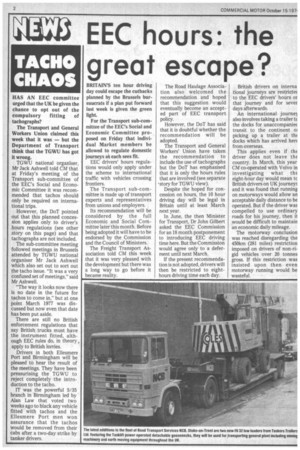ASX EEC hours: the great escape?
Page 4

If you've noticed an error in this article please click here to report it so we can fix it.
HAS AN EEC committee urged that the UK be given the chance to opt out of the compulsory fitting of tachographs?
The Transport and General Workers Union claimed this week that it was — but the Department of Transport think that the TGWU has got it wrong.
TGWU national organiser, Mr Jack Ashwell told CM that at Friday's meeting of the Transport sub-committee of the EEC's Social and Economic Committee it was recommended that tachos should only be required on international trips.
However, the DoT pointed out that this planned concession applies only to driver's hours regulations (see other story on this page) and that tachographs are not included.
The sub-committee meeting followed meetings in Brussels attended by TGWU national organiser Mr Jack Ashwell which also set out to sort out the tacho issue. "It was a very confused set of meetings," said Mr Ashwell.
"The way it looks now there is no date in the future for tachos to come in," but at one point March 1977 was discussed but now even that date has been put aside.
There are still no British enforcement regulations that say British trucks must have the instrument fitted, although EEC rules do, in theory, apply to British lorries.
Drivers in both Ellesmere Port and Birmingham will be pleased to hear the result of the meetings. They have been pressurising the TGWU to reject completely the introduction to the tacho.
IT was the powerful 5/35 . branch in Birmingham led by Alan Law that voted two weeks ago to black any vehicle fitted with tachos and the Ellesmere Port men won assurance that the tachos would be removed from their cabs after a two-day strike by tanker drivers. BRITAIN'S ten hour driving day could escape the cutbacks planned by the Brussels bureaucrats if a plan put forward last week is given the green light.
For the Transport sub-committee of the EEC's Social and Economic Committee proposed on Friday that individual Market members be allowed to regulate domestic journeys a each sees fit.
EEC drivers' hours regulations would only apply under the scheme to international traffic with vehicles crossing frontiers.
The Transport sub-committee is made up of transport experts and representatives from unions and employers.
Its recommendation will be considered by the full Economic and Social Committee later this month. Before being adopted it will have to be endorsed by the Commission and the Council of Ministers.
The Freight Transport Association told CM this week that it was very pleased with the development but there was a long way to go before it became reality. The Road Haulage Association also welcomed the recommendation and hoped that this suggestion would eventually become an accepted part of EEC transport policy.
However, the DoT has said that it is doubtful whether the recommendation will be adopted.
The Transport and General Workers' Union have taken the recommendation to include the use of tachographs but the DoT has emphasised that it is only the hours rules that are involved (see separate 'story for TGWU view).
Despite the hoped for concession on hours, the 10 hour driving day will be legal in Britain until at least March next year.
In June, the then Minister for Transport, Dr John Gilbert asked the EEC Commission for an 18 month postponement to introducing EEC driving time here. But the Commission would agree only to a deferment until next March.
If the present recommendation is not adopted, drivers will then be restricted to eighthours driving time each day. British drivers on interna tional journeys are restrictec to the EEC drivers' hours or that journey and for sever days afterwards.
An international journe3 also involves taking a trailer tc the docks for unaccompaniec transit to the continent oi picking up a trailer at thc docks which has arrived hert from overseas.
This applies even if thE driver does not leave thE country. In March, this year CM co-operated with Volvo in investigating what thE eight-hour day would mean tc British drivers on UK journey5 and it was found that running on motorways would allow an acceptable daily distance to be operated. But if the driver was compelled to use ordinary roads for his journey, then it would be difficult to maintain an economic daily mileage.
The motorway conclusion was reached disregarding the 450km (281 miles) restriction imposed on drivers of non-rigid vehicles over 20 tonnes gross. If this restriction was insisted upon then even motorway running would be wasteful.






















































































































